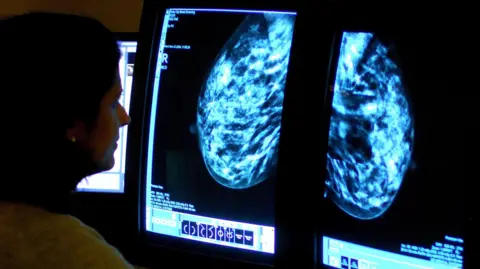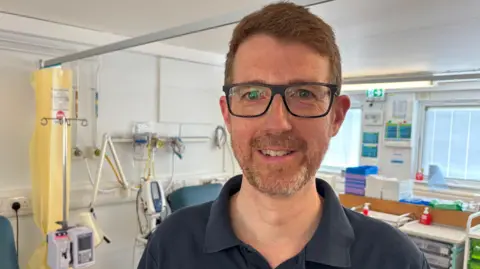
 BBC
BBC
Gwen Buchan had been clear of breast cancer for more than a decade until her secondary diagnosis last year
A drug which has been proven to extend the life of some people with incurable breast cancer has been given to patients on the NHS in Wales for the first time.
Gwen Buchan, 62, who has terminal breast cancer, said capivasertib would allow her to see her son's wedding and gave her "hope".
Half of women with breast cancer fuelled by the hormone oestrogen are likely to see their life expectancy double when capivasertib is combined with hormone therapy, research has shown.
Prof Rob Jones, who co-led a study looking at capivasertib's effectiveness, said the drug offered "a real life impact for people to spend extra time with their relatives, with their friends".
Breast cancer is the most common cancer in the UK, with one in seven women affected in their lifetimes and 75% surviving for 10 years or more after diagnosis.
In Wales, more than 2,000 people are diagnosed with breast cancer every year.
Capivasertib, which was developed by experts at Velindre Cancer Centre and Cardiff University, became available to breast cancer patients on the NHS in April.

 PA Media
PA Media
Trials showed capivasterib can also more than halve the rate at which cancer progresses
When Ms Buchan's first line of treatment for her terminal breast cancer stopped working, it was a set-back.
However, the recent approval of capivasertib for use on the NHS alongside hormone therapy will allow her to enjoy more time with family and friends.
She has a common genetic abnormality in her cancer which tests have shown responds well to the drug.
"To be told I had secondary breast cancer but my life can be extended, I think it's that hope you have to keep in your mind," said Ms Buchan from Barry, Vale of Glamorgan.
"I know that prior to the first line of treatment going down it was expected I'd live five or six years, maybe more.
"The way I cope with this is by thinking about today and today is a good day."
Ms Buchan is among thousands in the UK and millions worldwide who could benefit from the drug.
"I think I'm really lucky because I've got the most supportive husband, children and their partners and extended family and wonderful friends.
"What this drug can do for me is allow me to see my son's wedding next year and to look into the future."


Dr Simon Waters said the oral drug could be taken at home
Despite its approval for use globally by the US Food and Drug Administration (FDA) in 2023, capivasertib only became available to patients via the NHS in England and Wales this year.
Dr Simon Waters, consultant medical oncologist at Velindre Cancer Centre, said it was a "great opportunity now we've got to this point".
"People have been working on it for a long time. It's great we can now put it in to practice as a standard treatment," he said.
"We've been using a similar treatment for a smaller group of patients for a few years and that's had quite a lot of issues with side effects and we think this treatment will not only be more effective but also will have fewer issues with side effects.
"It's also applicable to a larger group of patients with this common type of breast cancer."
How does capivasertib work?
The drug is suitable for those with certain gene mutations that affect up to half of people with hormone receptor positive secondary breast cancer - the most common type, which grows in the presence of oestrogen.
Although hormone therapy usually works, eventually the cancer can become resistant to it.
A clinical trial found a particular protein which drives the resistance can be neutralised when hormone therapy is combined with capivasertib.
'Doubling of survival time'
Prof Rob Jones said: "Patients who received the hormone therapy with a placebo had an overall survival of around 20 months and those who received the capivasertib with the hormone therapy had an extra 39 months.
"It really is a doubling of survival time so that really is significant. It's not just a statistic - it's a real life impact for people to spend extra time with their relatives, with their friends."
Dr Nicola Williams, national director of support and delivery at Health and Care Research Wales, said: "A breast cancer diagnosis can be devastating and one in seven women will be diagnosed with the disease in their lifetime.
"This diagnosis is even more painful if you're told your cancer is incurable.
"Thanks to the trial and the licensing of capivasertib, when used alongside a standard hormonal therapy, patients like Gwen now have the potential to receive a very significant extension in their lifespan and improved quality of life."

 1 day ago
3
1 day ago
3









